- Home
- Warwick Deeping
Valour
Valour Read online
* A Distributed Proofreaders Canada eBook *
This ebook is made available at no cost and with very few restrictions. These restrictions apply only if (1) you make a change in the ebook (other than alteration for different display devices), or (2) you are making commercial use of the ebook. If either of these conditions applies, please contact a FP administrator before proceeding.
This work is in the Canadian public domain, but may be under copyright in some countries. If you live outside Canada, check your country's copyright laws. IF THE BOOK IS UNDER COPYRIGHT IN YOUR COUNTRY, DO NOT DOWNLOAD OR REDISTRIBUTE THIS FILE.
Title: Valour
Date of first publication: 1934
Author: Warwick Deeping
Date first posted: March 8, 2015
Date last updated: March 8, 2015
Faded Page eBook #20150336
This ebook was produced by: Mardi Desjardins, L. Harrison & the online Distributed Proofreaders Canada team at http://www.pgdpcanada.net
VALOUR
VALOUR
A Novel
BY WARWICK DEEPING
AUTHOR OF “SORRELL AND SON,” ETC.
NEW YORK, 1934
ROBERT M. McBRIDE & COMPANY
ALL RIGHTS RESERVED
VALOUR
PRINTED IN THE UNITED STATES
OF AMERICA
PUBLISHED, FEBRUARY, 1934
NO PART OF THIS BOOK MAY BE REPRODUCED
IN ANY FORM WITHOUT PERMISSION
IN WRITING FROM THE PUBLISHER
TO
COLONEL H. G. FALKNER, A.D.M.S.
WITH
THE AUTHOR’S SINCEREST RESPECT
AND GOOD WISHES
VALOUR
CHAPTER I
Pierce Hammersly let down the carriage window as the train ran into Scarshott Station, and leant out to see if any of his people had come to meet him, but the only familiar face was the face of Cripps the lame porter, who was snarling “Scar-shutt, Scar-shutt,” with an air of weary scorn.
“She might have come.”
Hammersly had not been looking for his parents. He was disappointed because the face that he most eagerly desired to see did not shine out on him with welcoming eyes. Love is a hunger, clamorous, unreasonable, and apt to be sulky unless a man has learnt to smile.
“What an idiot! How could she be here! I wanted her—that’s all.”
He shouted to the porter.
“Cripps, one kit bag and one valise in the van.”
Cripps stared at him dourly.
“Is the car outside?”
“Bin down twice already.”
A fat woman who was still comely enough to be interested in the other sex, nudged a friend, and they watched Lieutenant Hammersly walk down the platform.
“What I says is ’e used to be a bit skinny like, but ’e’s filled out wonderful.”
“And don’t ’e fancy ’imself.”
“And why shouldn’t ’e? I like a soldier man to walk with a bit of a swagger.”
Hammersly saluted an old lady who toddled up with smiling maternal eyes.
“I hear this is your last leave, Mr. Pierce.”
“Yes, that’s so.”
“And where are you going?”
“The Dardanelles.”
Her eyes grew serious, and then brightened.
“Oh dear, what a long way! But we are all very proud of you.”
He smiled down at her, saluted again, and passed on.
Hammersly’s drive through Scarshott had in it the subtler elements of a triumph. The grey stone roadway, like a pale reflection of the June sky, straggled uphill between the high red houses. The steep old town waved here and there a banner of roses. Everybody who counted in Scarshott seemed to have some business in the High Street, where the sun warmed the red brick houses and edged with gold the tall elms in the gardens behind them.
Just by the Georgian town hall, with its big bracket clock, sharp gables and leaden cupola, a wagon had got itself into difficulties and was holding up the traffic. Hammersly’s right hand kept rising to the peak of his cap. Kate Varley went by, smiling at him out of her dark eyes. Little Grace Rentoul hung for a moment blushing over the door of the car.
“Is it true that you are going out?”
“Quite true.”
Her ingenuous face paled visibly.
“I’m—I’m sorry.”
Then the traffic cleared and the car moved on.
Other women looked at Pierce Hammersly, women who could not claim a salute. There was a moment of tension in the feminine atmosphere of Scarshott High Street, a ripple of sexual excitement stirred by this man in khaki. The war had quickened life, touched the elemental emotions with a delicate and impulsive passion. The male and the female beheld in each other the finer vital contrasts.
Pierce Hammersly had always been a man worth looking at, not merely because the Hammerslys had been the richest people in Scarshott for half a century, but because he had a face and a temperament that were arrestive. Tall, clear faced, with rather restless eyes, he carried his head with an air of pride. Women were somewhat shy of him, because of a satirical cleverness that did not trouble to hide itself when people chattered provincially. He never argued; his individualism had a fierce independence of its own. He was an egoist, brilliant, charming when he pleased, the product of a selfish yet amiable refinement.
The great elms of King’s Walk covered broad stretches of grass with their shadows. The car turned in between the stone gate-pillars of Orchards, the house that a Hammersly had built more than a hundred years ago. Its white window frames and pillared porch blinked through the trees. Solidity, opulence, comfort, a serenity that had never been disturbed! There was a little deer park beyond the dark hush of the cedars. The lawns looked like beautiful green carpets. Everything was admirable, the roses, the glasshouses, the fruit garden, the yew hedges, the lake with its rhododendron-covered banks and its swans. Nothing could have been more English than this house of the Hammerslys, and yet it had lost the brick-red hardness of its Georgian days. It was soft and mellow and selfish without being bold. Life had been easy—before the war.
Porteous Hammersly, Esq., was loitering at the end of the drive, making a pretence of examining the standard roses for any trace of briar shoots.
“Well, well, here you are—at last.”
He held out a pink hand, and looked affectionately at his son over the top of a pair of gold-rimmed pince-nez perched halfway down his nose.
“I missed the connection, Dad.”
“We sent the car down to meet the 2.35.”
“And the train was late.”
“It’s becoming a habit with them, Pierce, an absolute habit.”
In some respects Porteous Hammersly resembled a plump, sleek, well-preened bird, a very debonair bird with bright and friendly eyes. He was inclined to strut, wore spats, loved talking. He had the pink and white face of a healthy boy, and was a little vain of his teeth and his hair. People who knew him well forgave him his small pomposities, because they had discovered the sensitive, kindly creature hidden in a worldly shell.
“Your letter was rather a shock to us, my boy.”
“I’m sorry, Pater.”
“I mean, we did not expect it to happen quite so soon. But these are epoch-making times. I’m proud to live in them. Your mother is in the drawing-room; of course she is feeling things, that is only to be expected; but then—duty, pride; she bears up on these.”
Sophia Hammersly was bearing up magnificently. A large, white woman in a large room, she rose slowly, spoke slowly and with great emphasis.
“My dear Pierce, this is a very great occasion.”
Her solidity matched her surroundings. The room was colourless, the furniture massive, a medley of heav
y wood bureaux, black lacquer cabinets, a Boule table or two, a Jacobean armoir, Louis Quinze chairs, an Empire clock and ornaments on the mantelpiece. The chesterfield, two or three armchairs, and the carpet were modern; conventional things upon which a great deal of money had been spent. It was a room without flowers, whereas old Porteous always had his library full of them.
Pierce kissed his mother, because it seemed the obvious thing to do.
“Beastly dirty these trains are.”
But Sophia Hammersly had not completed her period of solemnity. She never indulged in emotion, did not understand it, and her attitude towards it suggested that it was a quality that belonged only to little dressmakers who did not know how to behave themselves.
“We were not unprepared for the news, Pierce. Your father and I feel that we are making our sacrifice through you.”
“Meanwhile the firm is going to make a fortune out of leather.”
For the Hammerslys were tanners, dignified and extensive tanners who kept the smell of their craft at the farther end of the town. They also traded in hops and malt. Mrs. Sophia herself had inherited an income of a thousand pounds a year.
She subsided with stateliness among the cushions on the sofa.
“I have always wished, Pierce, that you would forget to be flippant.”
“I was only stating a fact, Mater. I have been falling over hard facts for the last six months. If you don’t mind I will go and clean up.”
“Tea will be ready in ten minutes, dear.”
“Excellent.”
Had Mrs. Sophia not been his mother Pierce would have allowed himself to hate her with absolute sincerity. She was everything that her son was not. He could not help knowing that she was ignorant, pretentious, arrogant, absurd, but her solid stupidity was as inopportune as it was real. Pierce’s inclinations were on the edge of outraging her prejudices. He knew it, and the knowledge irritated him.
He was restless. The familiar figures of his parents intruded upon the great emotion that dominated his consciousness. He detected a probable sympathiser in his father, an unendurable and aggressive obstinacy in his mother. Therefore he avoided her, willed himself into the library with old Porteous when tea was over, and so into the garden where things lived and bloomed and the sunlight streaked the grass with gold.
“What time is dinner, Pater?”
“Any time you like.”
“Can we make it eight? I want to see one or two people this evening.”
“These are your days, my boy.”
Porteous, being a man, did not ask questions.
They wandered about the place together, but Pierce was too preoccupied with his own romance, and the grim adventure ahead of him, to be interested in the familiar details of his home. Old Porteous loved the place, and he loved his son. He was proud of Pierce, and just a little astonished at this new soldier creature that the war had brought forth, this young man of arms who was going out to face death. Porteous Hammersly hid a sensitive timidity behind that pleasantly pompous manner. The war had confused and shocked him. He could only utter the old, complacent, British platitudes, and quote the stuff he read in his daily paper, persuading himself that everything was going splendidly, and that England could never be beaten.
“Well, Pierce—any news?”
“What sort of news?”
“Interior information. I suppose we are preparing to strike the death blow? When we have taken Constantinople——”
Pierce gave his father a curious look.
“Do you ever doubt about things, Pater?”
“What, about our winning?”
“In a way. You see, we had no idea—I mean the ordinary man had no idea—of the vastness of the job we had let ourselves in for. We had a sort of notion that we were going to recruit men by the hundred thousand, teach them to drill and shoot, and the business would be done. We didn’t suspect that we had got to think in army corps. We forgot about the co-ordination, the awful mass of technicalities, the brains required.”
Porteous glanced at his son like a troubled bird.
“Of course, it’s immense, but with the men as keen as mustard, Pierce——”
“Supposing you had been in the army, Pater—years ago—and had comfortably commanded a regiment, and you were lugged out at five and fifty to train and command a division of utter amateurs. Supposing you had to create things as you went along, with everybody in a dickens of a mess, and you knew that you were up against the best organised and the finest fighting nation on the face of the earth?”
“It’s not quite so bad as that, Pierce. Time is on our side; we shall do it.”
“And sweat blood over it, Pater. The big men behind the scenes must be living through a sort of devilish nightmare. I have glimpsed it now and again. Sometimes I think they are just cynics, fatalists, that no man could stand the strain unless he was a cynic. Hallo—you have done away with that fence beyond the beeches.”
His father’s eyes lit up.
“Yes, it used to spoil the vista, don’t you think so? Cut off the fine pedestals of the trees.”
“Of course it did. You have an eye for landscape, Pater. That is the funny part of this war; I have lost my vision. One’s old real self has been put in bondage, and every now and again it struggles fiercely and tries to break out.”
“Do you really like the life, Pierce?”
“Army life?”
“Yes.”
“Like it! I loathe it. I wish the whole of Europe was at the bottom of the sea. Still, here we are, up against destiny, having murdered most of our real soldiers because as a nation we wouldn’t face facts. I have got just six days, Dad, and I am going to forget the war—or try to.”
He held his head fiercely, and his eyes looked resentful.
“And yet one can’t forget it. I’m going out, and, in a way, I’m glad.”
They wandered out into the park, but Pierce Hammersly grew more and more restless, and kept glancing at his watch. He wanted dinner over, he wanted to get away from these two people who looked on him as their property, and who knew nothing of the real man in the body of their son. He belonged to someone else, utterly and completely, and he wanted to tell her the great truth, win her for himself before he went out—perhaps to die.
CHAPTER II
After dinner Mrs. Sophia followed her husband into the library, and since she disliked the room and never sat there during a normal day, her presence filled Porteous Hammersly with a sense of discomfort. Pierce had gone out by way of the high gate leading into the park, and Porteous had seen him disappear beyond the trees.
“Is Pierce out for a stroll?”
“He has gone out to see some people, Sophia.”
“Oh—! Who?”
Porteous felt a fool when he had to betray his ignorance.
“He didn’t tell me.”
“Didn’t you ask him?”
“No. Why should I?”
The opposing attitudes towards life of these two people showed in that question and answer. Mrs. Sophia looked annoyed. Her husband had a way of doing things that she thought quixotic and absurd. She was always telling him that he was much too generous and kind-hearted, too easily fooled.
“Have you ever considered the question of Pierce marrying?”
Porteous Hammersly put the evening paper aside, and showed himself resignedly attentive.
“I can’t say that I have, Sophia.”
“You mean you have not troubled?”
“I am not a believer in interference. After all, marriage——”
He did not complete what he had meant to say, simply because he had caught himself rushing into disastrous sincerity.
“I have a sense of parental responsibility, Porteous. I should like to see Pierce engaged before he leaves us. It is a unique opportunity——”
“But my dear Sophia, how do we know? Pierce has given us no indications.”
“Grace Rentoul would marry him.”
“But what has that to do wi
th it?”
His wife stared him out of countenance.
“What a haphazard creature you are, Porteous. You choose a boy’s career, and what is marriage but one of the great landmarks in his career? I—should like to see him engaged to Grace Rentoul.”
“But, my dear. You don’t understand Pierce.”
“I am asking her here to-morrow. I am going to let Pierce see as much of her as possible. He used to like her. And the Rentouls—well, they are the Rentouls.”
She spread her big white hands, and Porteous Hammersly glimpsed all that that gesture of hers implied. If a man was a baronet, had large estates, and a daughter who was gentle and charming—what more could the mother of a son desire?
“It means safety, Porteous, security. Young men are such fools.”
“I see, my dear. I appreciate your point of view, but would Grace suit our boy?”
“What earthly objection——?”
“Yes, yes, but we don’t all look at life in the same calm way. You don’t understand Pierce.”
“My dear Porteous, I understand him perfectly. Surely I ought to know my own son!”
* * *
Pierce Hammersly had left the long shadows of the park behind him, and was striking across Scarshott Common with its masses of furze and sweeps of heather. Scarshott stood on the edge of the pine country, a world of black spruces and Scots firs, of heather and bracken, with an occasional thicket of birches lightening the solemn gloom of the resinous trees. The sun was setting behind Claybury Hill, sending great slants of light over the oak woods and meadows about Scarshott town.
Pierce Hammersly’s objective lay over yonder where the common ended, and the woods began. It was a little white rough-cast cottage with a brown tiled roof, one of those very new cottages with a queer squat chimney, unnecessary buttresses, a mock oak and plaster gable over the porch, and a general air of studied originality. It was the first thing of its kind that had been perpetrated in Scarshott, where the Victorians had been content with adding a blunt brick ugliness to the finer Georgian atmosphere.

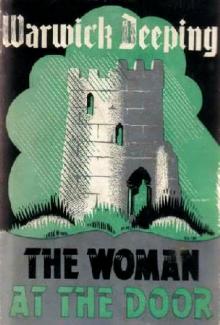 The Woman at The Door
The Woman at The Door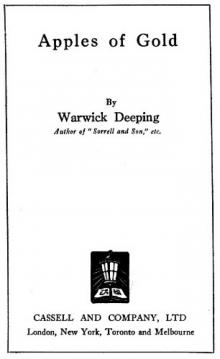 Apples of Gold
Apples of Gold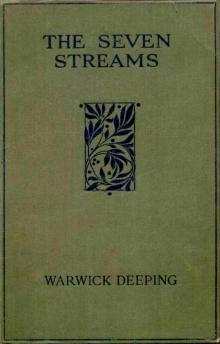 The Seven Streams
The Seven Streams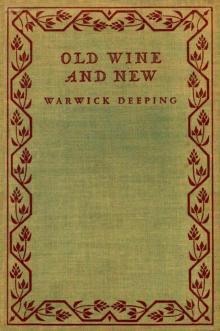 Old Wine and New
Old Wine and New No Hero-This
No Hero-This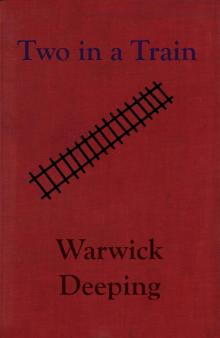 Two in a Train
Two in a Train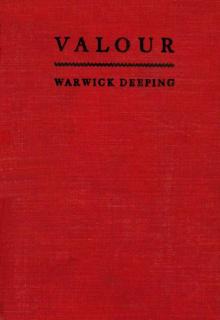 Valour
Valour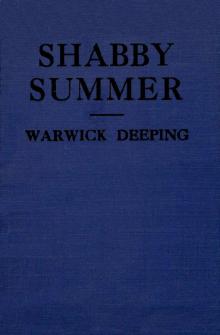 Shabby Summer
Shabby Summer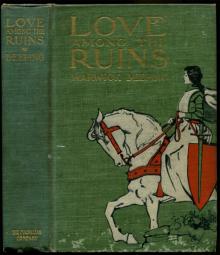 Love Among the Ruins
Love Among the Ruins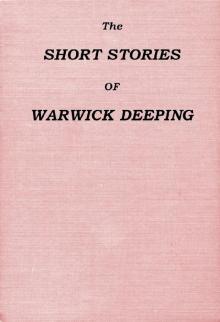 The Short Stories of Warwick Deeping
The Short Stories of Warwick Deeping